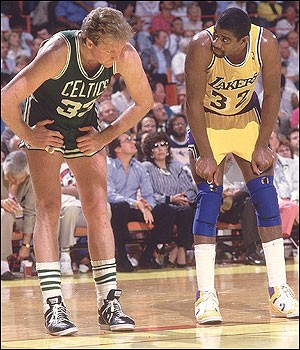A few hoop thoughts on my mind this week, so let’s get right to them:
• The last month of Grizzlies basketball has been nothing short of bizarre. An eight-game losing streak at home (hard to do) and a six-game winning streak on the road (hard to do). But if you look at the results, the twin streaks shouldn’t be all that shocking, as the disparity between opponents Memphis has faced on the road and at FedExForum is pronounced. The only three bottom-feeders have come away from home (New Jersey, Washington, New York) and the only four teams that can call themselves title contenders (Lakers, Atlanta, San Antonio, Phoenix) have been at FEF. Nonetheless, if the Grizzlies are playoff caliber, they take a game or two from fellow “bubble” teams Miami, Charlotte, or Portland on their home floor. The home drought will certainly end tonight (against New Jersey), right?
• I just finished reading Pistol, the fine biography of Pete Maravich by Mark Kriegel. One of the best sports biographies I’ve ever read, it’s almost certainly the saddest. Kriegel rightfully identifies Maravich as the bridge between Bob Cousy and Magic Johnson, the basketball savant essentially programmed — from age 3 — by his father to change the game. (Sound familiar, Tiger Woods fans?) The fact that Pistol Pete performed at the level he did, both in college and the NBA, with a heart pumping well short of capacity is beyond comprehension. The fact that his brilliance on the hardwood came at the expense of every other facet of a normal life makes the tale one of heartbreak. (Sample line: “He was damned to play a role scripted by the wants and needs of others.”) The word “legend” is overused in sports, but Pete Maravich is a legend, indeed, only confirmed by this book.
• My new peeve: When an NBA guard — playing for a team that’s trailing — allows an in-bound pass after an opponent’s score to roll toward midcourt, ostensibly saving precious seconds on the game clock. Pro guards can dribble the length of a basketball court in less than five seconds. This “technique” of intentionally not touching the ball saves, at the most, a pair of seconds on a possession. And I’m convinced any gained time is lost by the guard having to recover the ball and establish his dribble (while not running up the floor). If one game has been won via this gimmick, let me know and I’ll reconsider my stance. Until then, I await the day the rolling ball is stolen by the winning team and jammed through the rim for the game-clinching points.

• “A pair of athletes thrown together by the cosmos to compete.” So says narrator Liev Schreiber near the end of HBO’s documentary Magic & Bird: A Courtship of Rivals. My family moved to Orange County, California, in 1979, the same year Magic Johnson arrived and somehow became the biggest celebrity in a city of celebrities. I later went to college in Boston during the latter half of Larry Bird’s sublime career with the Celtics. (I spent some preschool years in Atlanta when Maravich was a Hawk, but can’t reflect in the same way on that proximity.) HBO’s film manages to document what may be the most significant sports pairing of the last 50 years. And that’s really what Bird and Magic were: a pairing. Sure, they battled in an NCAA championship and three times in the NBA Finals, but together, they saved the NBA while at the same time serving as talking points for subjects as challenging as race, fame, politics, even disease. Having grown up in the Eighties — especially having lived in each of their neighborhoods for a period of time — I find this tandem’s influence profound when it comes to my view of modern athletes, and the struggle among so many of them to balance celebrity with the will to be a champion. Early in the film, Bird says people will be talking about his rivalry with Magic 100 years from now. And he’s right.